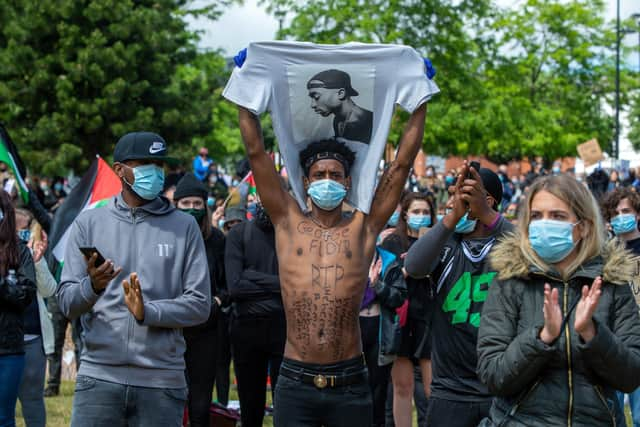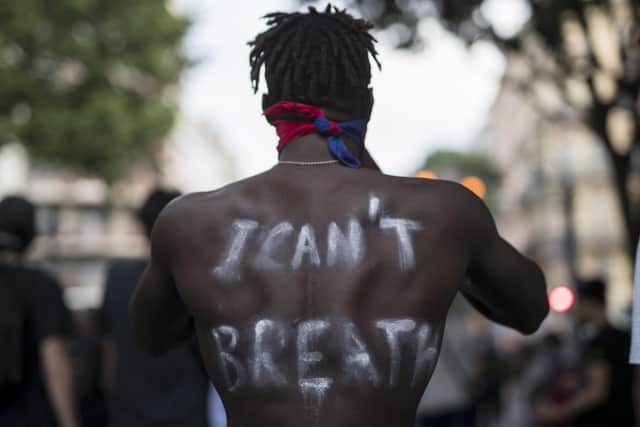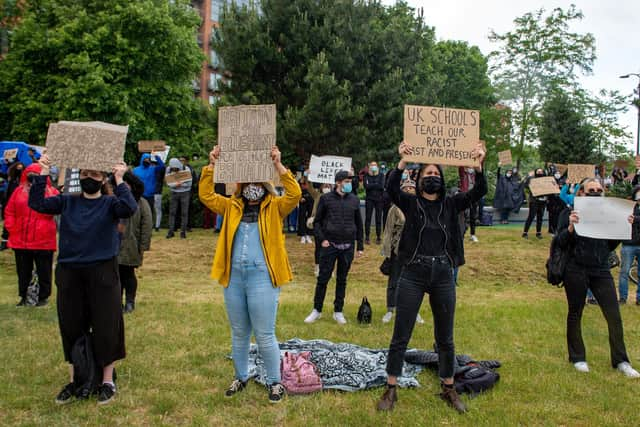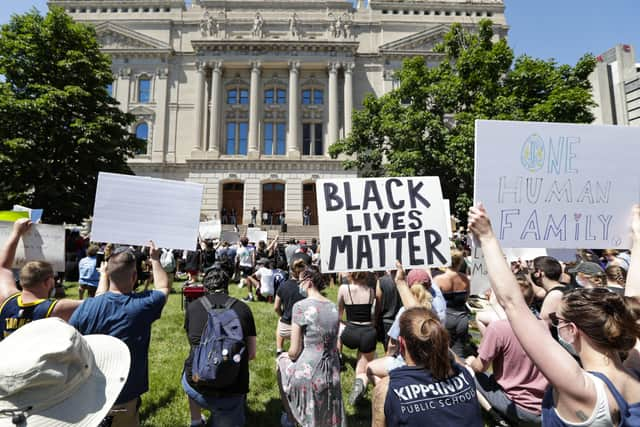Racial discrimination is like Covid-19 - a virus we can tackle: Iyiola Solanke
There are many similarities. Like a coronavirus, discrimination cannot be seen with the naked eye. Yet, it is highly infectious and can pass from one person to another rapidly, often without recipients being aware that they have been infected.
Like a virus, you can’t see discrimination but victims recognise how it sounds and how it feels – they experience the results of the infection. Like a virus, discrimination affects the mind, body and the spirit.
Advertisement
Hide AdAdvertisement
Hide AdThe discrimination virus has the potential to affect the life of a victim every day for a lifetime and, like Covid-19, it can maim and kill – think of George Floyd in Minnesota or Mikey Powell in the Midlands, both killed through asphyxiation in police custody. Or Oury Jalloh, who mysteriously burnt to death in a German police cell. Like Covid-19, the virus of discrimination does not respect borders. In other words, both are deadly.


There are, however, key differences – a medical virus may be active in an individual’s body and society for a short time of the year, and maybe not even every year; the discrimination virus has the potential to affect the life of a person everywhere and every day for a lifetime.
It can claim a target at anytime, anywhere.
Take for example Christian Cooper, a black man who was watching birds in Central Park in New York when a white woman unleashed the virus of racism. The reason: Mr Cooper had asked her to put her dog on the leash, as per the rules in that area.
In resentment and rage that a black man dare to police her behaviour, Amy Cooper (no relation) called the police, pretending that she was being threatened by a black man. However, her plan backfired and she became maimed by the virus she aimed to spread.
Advertisement
Hide AdAdvertisement
Hide Ad

This indicates another key similarity: like a virus, discrimination hurts everybody. If discrimination is a virus, can it be tackled using public health approaches?
The public health approach to tackling a virus is multi-level – as we see with Covid-19. In addition to treatment of the individual, there are also measures taken at the institutional and environmental level.
Infection control is just one form of action: it is equally vital to take a broader set of actions to halt the spread of the disease.
From the perspective of public health, elimination of a virus from society requires identification of the social source and interruption of its path – social action to stop new infection and re-infection is as essential as curing infected individuals.
Advertisement
Hide AdAdvertisement
Hide Ad

Interventions to reduce or remove risks in the environment are the norm rather than the exception – the public or social aspects of the epidemic must be addressed in order to break the chain of infection.
In order to break the chain of infection, public health specialists must identify certain factors. These include, for example, the mode of transmission.
In relation to Covid-19, experts identified that the virus passed from person to person through contaminated droplets from the mouth and contact with contaminated surfaces.
In relation to racial discrimination, the mode of transmission could be visual – for example, images that present black men as criminals rather than judges, entrepreneurs or astronauts.
Advertisement
Hide AdAdvertisement
Hide Ad

Ultimately, in public health, success depends upon a very high level of co-ordination and co-operation with national authorities, between the public and private sectors, teaching hospitals, universities and volunteers.
The faster, more co-ordinated and more committed the reaction to a virus, the more effective it is. Interventions are also joined up for maximum impact.
Tackling Covid-19 is everybody’s business – those who suffer are not left to overcome the virus by themselves – and the same applies to discrimination.
Those who suffer the most are themselves also key targets of discrimination.
Advertisement
Hide AdAdvertisement
Hide AdImagine if we use this approach to tackle discrimination: if discrimination is viewed as a virus, a public health style intervention can help us to more effectively tackle and perhaps even eradicate it.
Professor Iyiola Solanke is chair in EU law and social justice at the University of Leeds’ School of Law.
Editor’s note: first and foremost - and rarely have I written down these words with more sincerity - I hope this finds you well.
Almost certainly you are here because you value the quality and the integrity of the journalism produced by The Yorkshire Post’s journalists - almost all of which live alongside you in Yorkshire, spending the wages they earn with Yorkshire businesses - who last year took this title to the industry watchdog’s Most Trusted Newspaper in Britain accolade.
Advertisement
Hide AdAdvertisement
Hide AdAnd that is why I must make an urgent request of you: as advertising revenue declines, your support becomes evermore crucial to the maintenance of the journalistic standards expected of The Yorkshire Post. If you can, safely, please buy a paper or take up a subscription. We want to continue to make you proud of Yorkshire’s National Newspaper but we are going to need your help.
Postal subscription copies can be ordered by calling 0330 4030066 or by emailing [email protected]. Vouchers, to be exchanged at retail sales outlets - our newsagents need you, too - can be subscribed to by contacting subscriptions on 0330 1235950 or by visiting www.localsubsplus.co.uk where you should select The Yorkshire Post from the list of titles available.
If you want to help right now, download our tablet app from the App / Play Stores. Every contribution you make helps to provide this county with the best regional journalism in the country.
Sincerely. Thank you.
James Mitchinson
Editor
Comment Guidelines
National World encourages reader discussion on our stories. User feedback, insights and back-and-forth exchanges add a rich layer of context to reporting. Please review our Community Guidelines before commenting.